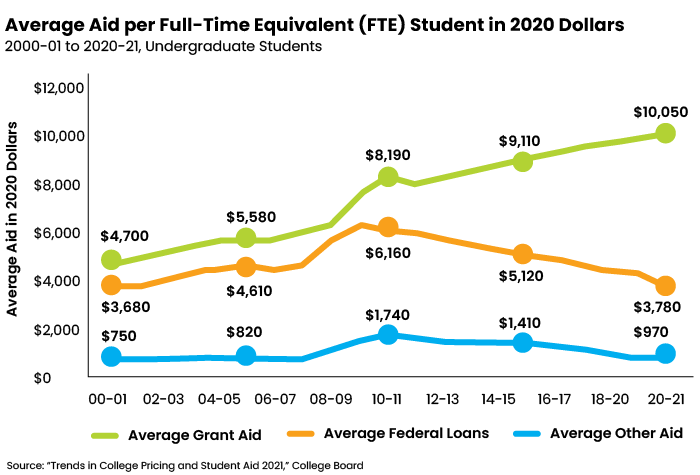
Perhaps the most impactful consequence of Covid for college in America is the recalibration of the value proposition associated with higher education. Affordability is in the eye of the beholder and both students and parents are questioning the cost/benefit of four years (or more) at colleges today. If your clients have children attending or soon headed to college, they may be asking you what you think.
Our ability to remove the emotion from this conversation and present the facts can be invaluable to our clients. But first, a little perspective.
Depending on the clients we serve, college affordability and the role of financial aid may be a more important planning issue than it was before the pandemic. A recent survey of high school students found that the likelihood of attending a four-year school sank nearly 20 percentage points in the last eight months — to 53% from 71%, according to ECMC Group, a nonprofit aimed at helping student borrowers.
According to the National Student Clearinghouse Research Center, undergraduate enrollment for Fall 2021 declined 3.5% from a year earlier and shrunk 7.8% compared with Fall 2019.
A New Lens
It’s unlikely that many of our clients’ children will have to forgo college. Many of us work with financially successful, savings-oriented clients who were able to work from home through the lockdowns, maintain full employment and keep their lifestyles afloat. But their priories and college budgets may have shifted for a variety of reasons.
Some of our clients have encountered real financial challenges — including losing jobs and businesses. Some have lost loved ones to the dreaded virus and have had to settle estates on top of everything else.
One of my client’s children has decided to seek out an associates degree at the local community college – effectively earning credits at a significantly discounted cost with the idea the student will attend the more expensive four-year college but do so when they are free to attend classes without masks, move freely around the campus and really embrace the college experience. I think of this as the ultimate “hedge” – remain productive and on schedule while waiting for the “new normal” to emerge.
Several independent education consultants I spoke with told me they’re seeing the resilience and flexibility of students emerge, often times in conflict with the parent’s concern for safety and proximity. The students still want to spread their wings and engage in the experience of a college campus in another state while moms and dads are a bit more hesitant to let them venture beyond reasonable driving distance. Some of this isn’t knew – the pandemic simply amplified this difference of opinion in most households.
As we journey further into the transition from the knowledge economy to the experience economy, our clients have been forced to pause and consider the “cost of college” from several different vantage points — time, effort, energy, expected outcome vs. actual outcome and, of course, money.
The Silver Linings
The silver lining in the literal mask being lifted, as we (hopefully) approach the end of the pandemic, is we are seeing college from a different perspective and learning there may be different and better ways to assess the value.
Another silver linking is that tuition increases have been historically low for the second year.
College Need-to-Knows
During these trying times, clients need us more than ever to serve as a trusted guide, an accountability partner and a resource to lean on to help navigate the complexity and confusion surrounding college. And because the “college purchase” is multi-faceted, it’s important for us to understand the key elements that contribute to the final price. Here are some things to bear in mind.
Admissions Standards Are Changing
The three traditional key criteria for college admissions decisions – grade point averages, admissions tests and strength of high schools’ curriculum – have been scrambled and it’s important that parents and students understand this. Many high schools transitioned poorly from in-classroom to online curriculum and reverted grades to pass/fail. More college have moved to a “test optional” admissions process. Families need to familiarize themselves with college’s admissions requirements which may be different than anticipated.
Students are also less likely to have as many extracurricular activities because many things have cancelled, so they’ve had to get more creative in their admissions essays, especially if they’re seeking scholarship money.
Mind the Gaps
Whether it falls under mental health, socialization, or inter-personal skills, the deficit students are digging out from after two pandemic years is real. Dollars that was allocated for but not spent on after-school activities can be redirected to counseling and tutoring to pave the way for a successful transition to college.
Aid and Scholarships Have Shifted
Average federal loans have declined but average grant aid has increased. Finding colleges that are more likely to discount costs based on the merit of the student is becoming an increasingly important part of the funding equations for families who are more hesitant to take on more debt.

Local Schools May Not Be Cheaper
Applying to and attending colleges closer to home is a definite trend, but the economics of casting a closer net may not result in a lower cost. Out-of-state still costs more than in-state tuition, even if it’s only an hour or two away; and in-state class availability (or lack thereof) may necessitate extending beyond four years for that undergraduate degree. In other words, closer may come at a higher cost.
Study Abroad is Being Postponed
Study abroad remains of interest but is being postponed for fear of being “locked down” and unable to get home easily and/or mixed feelings about vaccination and boosters that are required to travel and live outside the U.S. Different countries have different policies and procedures, and families are hesitant to leap into the unknown just yet. [HYPERLINK on study abroad. If the war in Ukraine persists, this is also likely to deter future study abroad plans to many popular destinations.
Final Thoughts
The longer-term implications of college in the Covid era are still playing out.
A client of mine told me last week that her high school sophomore is seeing the faces of his classmates for the very first time – because mask restrictions have been lifted at his high school. He remarked that many of the kids didn’t look like he thought they would. It seems like getting a limited glimpse of things may shape our perceptions in ways that turn out not to be completely accurate. That’s certainly been the case as it relates to all thing’s “college” during Covid.
As advisors, we are often challenged to help our clients manage their overall well-being and, at times like these, providing expertise in the areas that determine the money can be as important as managing the actual dollars and cents.
Beth V. Walker is a wealth advisor with Carson Wealth Management and founder of Center for College Solutions, which is based in Colorado Springs, Colo. She can be reached at bwalker@carsonwealth.com or 719-522-2278.







